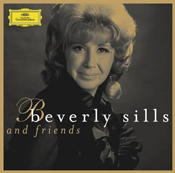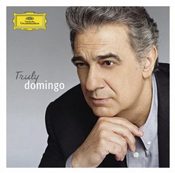
25 Apr 2007
Beverly Sills & Placido Domingo
More than ever, compilations of previously released material fill the shelves of those stores still selling classical music.
The Sixteen continues its exploration of Henry Purcell’s Welcome Songs for Charles II. As with Robert King’s pioneering Purcell series begun over thirty years ago for Hyperion, Harry Christophers is recording two Welcome Songs per disc.
In February this year, Albanian soprano Ermonela Jaho made a highly lauded debut recital at Wigmore Hall - a concert which both celebrated Opera Rara’s 50th anniversary and honoured the career of the Italian soprano Rosina Storchio (1872-1945), the star of verismo who created the title roles in Leoncavallo’s La bohème and Zazà, Mascagni’s Lodoletta and Puccini’s Madama Butterfly.
Collapsology. Or, perhaps we should use the French word ‘Collapsologie’ because this is a transdisciplinary idea pretty much advocated by a series of French theorists - and apparently, mostly French theorists. It in essence focuses on the imminent collapse of modern society and all its layers - a series of escalating crises on a global scale: environmental, economic, geopolitical, governmental; the list is extensive.
Amongst an avalanche of new Mahler recordings appearing at the moment (Das Lied von der Erde seems to be the most favoured, with three) this 1991 Mahler Second from the 2nd Kassel MahlerFest is one of the more interesting releases.
If there is one myth, it seems believed by some people today, that probably needs shattering it is that post-war recordings or performances of Wagner operas were always of exceptional quality. This 1949 Hamburg Tristan und Isolde is one of those recordings - though quite who is to blame for its many problems takes quite some unearthing.
The voices of six women composers are celebrated by baritone Jeremy Huw Williams and soprano Yunah Lee on this characteristically ambitious and valuable release by Lontano Records Ltd (Lorelt).
As Paul Spicer, conductor of the Royal Birmingham Conservatoire Chamber Choir, observes, the worship of the Blessed Virgin Mary is as ‘old as Christianity itself’, and programmes devoted to settings of texts which venerate the Virgin Mary are commonplace.
Ethel Smyth’s last large-scale work, written in 1930 by the then 72-year-old composer who was increasingly afflicted and depressed by her worsening deafness, was The Prison – a ‘symphony’ for soprano and bass-baritone soloists, chorus and orchestra.
‘Hamilton Harty is Irish to the core, but he is not a musical nationalist.’
‘After silence, that which comes closest to expressing the inexpressible is music.’ Aldous Huxley’s words have inspired VOCES8’s new disc, After Silence, a ‘double album in four chapters’ which marks the ensemble’s 15th anniversary.
A song-cycle is a narrative, a journey, not necessarily literal or linear, but one which carries performer and listener through time and across an emotional terrain. Through complement and contrast, poetry and music crystallise diverse sentiments and somehow cohere variability into an aesthetic unity.
One of the nicest things about being lucky enough to enjoy opera, music and theatre, week in week out, in London’s fringe theatres, music conservatoires, and international concert halls and opera houses, is the opportunity to encounter striking performances by young talented musicians and then watch with pleasure as they fulfil those sparks of promise.
“It’s forbidden, and where’s the art in that?”
Dublin-born John F. Larchet (1884-1967) might well be described as the father of post-Independence Irish music, given the immense influenced that he had upon Irish musical life during the first half of the 20th century - as a composer, musician, administrator and teacher.
The English Civil War is raging. The daughter of a Puritan aristocrat has fallen in love with the son of a Royalist supporter of the House of Stuart. Will love triumph over political expediency and religious dogma?
Beethoven Symphony no 9 (the Choral Symphony) in D minor, Op. 125, and the Choral Fantasy in C minor, Op. 80 with soloist Kristian Bezuidenhout, Pablo Heras-Casado conducting the Freiburger Barockorchester, new from Harmonia Mundi.
A Louise Brooks look-a-like, in bobbed black wig and floor-sweeping leather trench-coat, cheeks purple-rouged and eyes shadowed in black, Barbara Hannigan issues taut gestures which elicit fire-cracker punch from the Mahler Chamber Orchestra.
‘Signor Piatti in a fantasia on themes from Beatrice di Tenda had also his triumph. Difficulties, declared to be insuperable, were vanquished by him with consummate skill and precision. He certainly is amazing, his tone magnificent, and his style excellent. His resources appear to be inexhaustible; and altogether for variety, it is the greatest specimen of violoncello playing that has been heard in this country.’
Baritone Roderick Williams seems to have been a pretty constant ‘companion’, on my laptop screen and through my stereo speakers, during the past few ‘lock-down’ months.
Melodramas can be a difficult genre for composers. Before Richard Strauss’s Enoch Arden the concept of the melodrama was its compact size – Weber’s Wolf’s Glen scene in Der Freischütz, Georg Benda’s Ariadne auf Naxos and Medea or even Leonore’s grave scene in Beethoven’s Fidelio.

More than ever, compilations of previously released material fill the shelves of those stores still selling classical music.
For vocal artists, this often means a career retrospective. Deutsche Grammophon has the “Portrait of the Artist” series, double-CD sets promoting mostly its current roster of artists — including a relatively new star, such as Magdalena Kozena. Each set has its own title, possibly leading the unwary to think the release contains new material. Kozena’s, for example, is called “Enchantment.” For tenor Placido Domingo, the marketers promise his fans “Truly Domingo.” DG has also brought forth a set of Beverly Sills excerpts, though not designated as part of the “Portrait” series, with the number of other fine artists featured acknowledged in the title: “Beverly Sills and Friends.”
Domingo’s career started around the same time as Sills’, but he still commands a top-rank position in the opera world, while she has been retired for some years. The cover of Domingo’s set features his handsome face, with the silver hair more than any lines on his face identifying his age. The Sills cover photo looks to come from the 1970s, with a blouse as full of ruffles as her hair is brilliant and towering. The freshness of the performances inside the two sets, however, prompts a different response.
 Domingo has always been praised, and rightly so, for his impeccable musicianship and handsome
tone. He is not a tenor to sob, stretch out climaxes, or glory in the top notes (seldom easy for
him). The booklet essay maintains that his greatest contributions came in Verdi, and each of the
two discs starts with several selections from that composer. Though always tasteful and
committed, in none of the more familiar selections does Domingo offer a strong individual
reading. His Duke in “La donna è mobile” has little swagger. His Alfredo in the act two Traviata
aria lacks an impetuous edge to the passion expressed. The “Di quella pira” feels tame, and much
too slow (under Carlo Maria Giulini’s baton). Only in the Otello selections, from the
Myung-When Chung set, does Domingo bring forth a solid interpretation. The two Puccini
selections, “Donna non vidi mai” and “Nessun dorma,” boast the rewards of Domingo’s warm
middle voice, but the tight top compromises the effect. Domingo would have been better served
with selections from the Mehta La Fanciulla del West set, one of the tenor’s stronger performances.
Domingo has always been praised, and rightly so, for his impeccable musicianship and handsome
tone. He is not a tenor to sob, stretch out climaxes, or glory in the top notes (seldom easy for
him). The booklet essay maintains that his greatest contributions came in Verdi, and each of the
two discs starts with several selections from that composer. Though always tasteful and
committed, in none of the more familiar selections does Domingo offer a strong individual
reading. His Duke in “La donna è mobile” has little swagger. His Alfredo in the act two Traviata
aria lacks an impetuous edge to the passion expressed. The “Di quella pira” feels tame, and much
too slow (under Carlo Maria Giulini’s baton). Only in the Otello selections, from the
Myung-When Chung set, does Domingo bring forth a solid interpretation. The two Puccini
selections, “Donna non vidi mai” and “Nessun dorma,” boast the rewards of Domingo’s warm
middle voice, but the tight top compromises the effect. Domingo would have been better served
with selections from the Mehta La Fanciulla del West set, one of the tenor’s stronger performances.
Disc one ends, after an ardent “flower aria” from Carmen and a slice of the Kubelik Oberon, with Wagner, where Domingo’s handsome tone can pour out and his top is less often called upon.
Disc two starts with some rarer Verdi, from the large DG set of a few years back covering all the major Verdi tenor roles. In this lesser-known material, Domingo’s firm grasp of the melodic line is much appreciated. Regrettably, the dramatic introduction to Luisa Miller’s “Quando la sere al placido” is not included. Ending the set are some rather bland selections from a disc of “spiritual”-themed music of a few years ago, and some much more enjoyable and idiomatic singing of songs and zarzuela selections.
The Sills set features large sections from her complete opera recordings, and ends with a wonderful potpourri of numbers with Charles Wadsworth accompanying her, from Schubert and Handel to Arne and Adam. By the end of the second disc, a more through and detailed “Portrait of the Artist” has been drawn than the Domingo set provides. In Manon and Lucia, Sills’s soprano has a wonderfully brilliant lightness, yet the dark edges of each character also come through . Then, in selections from her three Donizetti queens, she takes on a more dramatic thrust, while maintaining her control of florid passages. These longer excerpts, featuring such fine other singers as Shirley Verrett and Eileen Ferrell, provide time for a fuller view of the dimensions of Sills’ s art than Domingo can convey in his aria-intensive overview.
Disc two opens with Ms. Sills’s sensual Giulietta from Les Contes d’Hoffman and then offers her Baby Doe from Douglas Moore’s opera. Your reviewer is among those who find the music, and especially the libretto, unfortunately dated and old-fashioned, but Ms. Sills does sound impressively lovely in the “Willow song.”
The last half of the second disc is an uninterrupted stream of delights, with rare material, from baroque to early classical era. The style pre-dates the onset so-called “historically-informed performances,” but anyone who can resist the charm of Ms. Sills’s singing here is, well, over-informed. A lively aria from Lehar’s Der Zarewitsch closes the set.
Domingo might have been better served by a different set of selections, but DG has done wonderfully by Ms. Sills. For those who have had limited exposure to her achievements, Beverly Sills and Friends deserves a strong recommendation.
Chris Mullins